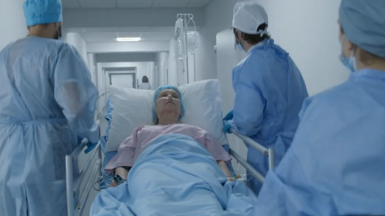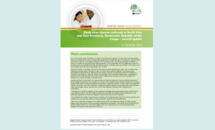Rapid risk assessment: Ebola virus disease outbreak in North Kivu and Ituri Provinces, Democratic Republic of the Congo – second update
This is the second update of a rapid risk assessment originally produced on 9 August 2018. This rapid risk assessment addresses the public health risk associated with the current Ebola virus disease (EVD) outbreak in the Democratic Republic of the Congo (DRC) and its implications for EU/EEA citizens. This update was triggered by the persistence of the EVD transmission in urban areas, reported challenges in documenting chains of transmission and the recent upsurge of clusters of EVD cases surrounding geographically dispersed rural areas in DRC.
Executive Summary
As of 16 December 2018, the Ministry of Health of the Democratic Republic of Congo (DRC) has reported 539 Ebola virus disease (EVD) cases, including 48 probable and 491 confirmed cases. This epidemic in the provinces of North Kivu and Ituri is the largest outbreak of EVD recorded in DRC and the second largest worldwide. A total of 315 deaths occurred during the reporting period. As of 16 December 2018, 52 healthcare workers (50 confirmed and two probable) have been reported among the confirmed cases, and of these 17 have died. As of 10 December 2018, the overall case fatality rate was 58%.
Since mid-October, an average of around 30 new cases has been reported every week, with 14 health zones reporting confirmed cases in the past 21 days. This trend shows that the outbreak is continuing across geographically dispersed areas. Although the transmission intensity has decreased in Beni, the outbreak is continuing in Butembo city, and new clusters are emerging in the surrounding health zones. A geographical extension of the outbreak (within the country and to neighbouring countries) cannot be excluded as it is unlikely that it will be controlled in the near future.
Despite significant achievements, the implementation of response measures remains problematic because of the prolonged humanitarian crisis in North Kivu province, the unstable security situation arising from a complex armed conflict and the mistrust of affected communities in response activities. In recent weeks, the suboptimal infection prevention and control measures in healthcare settings, especially unregulated ones, have resulted in cases among health workers (around 10%), which have played an important role in amplifying the transmission.
The response to the Ebola outbreak will face additional challenges during the ongoing election period due to mass-gathering events, and other health emergencies associated with outbreak-prone diseases that could potentially jeopardise the resources available to prevent and control the EVD epidemic.
The probability that EU/EEA citizens living or travelling in EVD-affected areas of the DRC will be exposed to the disease is low, provided they adhere to the precautionary measures recommended below.
There are no international airports in the affected areas of DRC that offer direct flights to EU/EEA Member States, which limits the risk of the virus being introduced into the EU/EEA. The overall risk of introduction and further spread of Ebola virus within the EU/EEA is very low. However, the risk can only be eliminated by stopping transmission at the local level in the DRC.
Download
Read more
Rapid risk assessment: Ebola virus disease outbreak in North Kivu and Ituri Provinces, Democratic Republic of the Congo – first update
This rapid risk assessment addresses the public health risk associated with the current Ebola virus disease outbreak in the Democratic Republic of the Congo and its implications for EU/EEA citizens. This is the first update of a rapid risk assessment originally produced on 9 August 2018.





